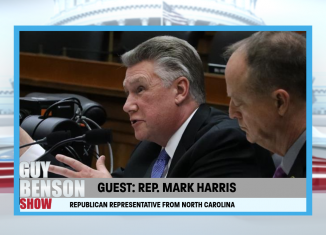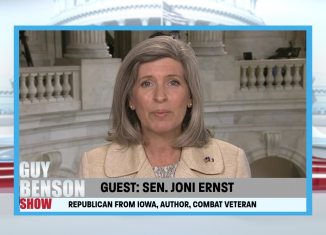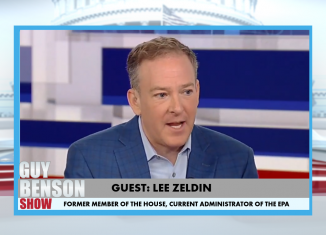Andrew McCarthy: Criminalizing Political Speech Opens ‘Can of Worms’
Andrew McCarthy, Fox News contributor, former federal prosecutor and bestselling author joined the Guy Benson Show to discuss the new bombshell Devin Archer testimony and the new indictment against former President Donald Trump.
Listen to the full interview below:
Full Transcript:
Guy Benson: Back with us now is Andy McCarthy, Fox News contributor, former federal prosecutor, bestselling author. Andy, I feel like you should get a punch card for how often you’re on this show. You get a free appearance every so often or like a a box of donuts or something, a necktie, because you’ve been here quite a lot. We always appreciate it. Your skills are in high demand, especially in moments like this. With all the legal questions out there. We do appreciate it. Welcome back.
Andy McCarthy: Well, nice to be back, Guy. Thank you so much.
Guy Benson: So last evening we announced it here on the air late in the show that indeed this anticipated indictment against Donald Trump, another one was coming down. We heard from Jack Smith after our show was over. He made a brief statement. And here we are looking at indictment number three against the former president, one in New York City, Alvin Bragg, Manhattan. You and I have talked about that. I think we agree on the weakness of that case, to put it kindly. Then there’s the Mar a Lago obstruction documents case. And that’s a pretty significant case that got, in my view, stronger last week with additional charges and new evidence. And now we have this one involving January 6th and Trump’s post-election behavior, conduct and statements. This is the same special counsel, Jack Smith, who brought the Mar a Lago case. He’s now bringing this case as well in Washington, D.C.. You and I knew that something like this was likely coming down the pike. Here it is. You had expressed some initial skepticism before you could actually see the document yourself. Now that you’ve read it, what is your assessment of this new indictment?
Andy McCarthy: Well, it’s as weak as I feared it would be. And I think in to cut to the chase Guy, I think it’s it’s a political act that’s dressed up as a legal prosecution. It’s it’s political in the sense that they’re trying to substitute the criminal justice process for the failure to impeach Trump through the political process. And it’s political on the other end, because the objective here clearly is to try to push this case to trial during the run up to the 2024 election. And I think the tell weakness here is not just in in the what I think is the infirmity of the four specific charges, which we can talk about. But but I think the signal here you’ve got from the very statement of Jack Smith that you just referred to. And I would say parallel to that, the last section of his 45 page indictment, beginning around page 39, where he goes on at some length about the Capitol riots and the rioters breaching the defenses, assaulting police officers and security forces, violently breaking into the building and so on. The problem with all that is Trump isn’t charged with any of the violence of the day. And that’s not at all surprising given that the Justice Department has charged about 1100 people in connection with the Capitol riot and has consistently taken the position that Trump was not complicit. He’s never been named as an unindicted coconspirator. You can you can find him, as I do, morally and politically culpable for that event. But you can’t make it legally actionable unless you can show he intended for violence to happen and contributed to it in some way. He doesn’t have that evidence, but he’s trying to get it in the case. And the only reason that I can think of for that would be he’s fearful that the actual counts that he’s brought are weak. So he’s hoping to induce the jury to convict by firing them up. And more to the point, since the idea is to get this case to trial in the run up to the election. That’s the kind of evidence and imagery he wants in the minds of voters as they go to the polls.
Guy Benson: Right. Like, let’s have a very high profile legal proceeding playing out during an election season, quite possibly relitigating the 2020 election and the aftermath and that horrible, disgraceful day of January 6th. Front and center all over again. I mean, we’ve litigated it a number of times, Andy, as it happened right after it happened, the impeachment process in the House, the impeachment trial in the Senate, the January six committee, the special committee that went on for many months and had all their presentations and their prime time hearings. The American people know what happened. I think it was very bad. The facts are very bad for Trump for good reason. He is, as you said, morally and politically culpable for a lot of what happened that day and what led up to it, the lies that he told. I’ve been asking, is that criminal? Is that actually a crime? And Jack Smith says, yes, it’s these four crimes. This is what they’re trying to prove. You said his statement was demagogic. I saw it last night on TV. That was one of the words that you used. Why do you say that? And setting aside whatever his motives might be or the politics at play, why do you think the charges themselves are weak from a legal standpoint?
Andy McCarthy: Well, I say demagogic guy because he hasn’t charged Trump with the Capitol riot. So why in a short statement, after the only statement he’s making publicly after the indictment, would he dwell only on the Capitol riot and not on the charges he actually brought? And I think that is it conveys exactly that the intention here is to get the Capitol riot in front of people. He can’t do it by virtue of a charge. So he’s trying to have indirect ways of getting it into the case. But why lead with it in your in your press conference about the indictment when it’s not a charge that you’ve brought in the case As far as the four charges are concerned, you know, it was only in May of so we’re talking about less than three months ago now that the Supreme Court held in the two cases involving cronies of Andrew Cuomo, whose political corruption convictions were thrown out by the Supreme Court, that the Supreme Court unanimously reminded everyone that fraud in federal law means a scheme, a deceptive scheme to bilk somebody out of money or property, and that it’s not supposed to be expanded and extended by prosecutors in order to enforce somebody’s idea of what good governance is. There are a lot of deceptive schemes that are reprehensible. As you could tell from the indictment, there’s a surfeit of information there of what I regard as deceptive conduct by Trump. But under federal law, if you’re going to bring something is a fraud, It’s got to be in order to bilk somebody out of money or property, which this obviously is not as far as the obstruction counts are concerned. Everyone is allowed to try to influence Congress when it becomes a crime is when you corruptly influence Congress. And the question there is what is corruptly being. It’s yet another one of these kind of ambiguous terms that can be stretched and if it is stretched, can chill people from engaging in conduct that’s otherwise constitutionally permissible. And I think what’s happening in those counts is he’s trying to criminalize a specious legal theory propounded by John Eastman. And there’s a lot of things you could say that about that. But I don’t think it’s not there’s no precedent for criminalizing a bad legal theory. And I think it’s a road that we don’t want to go down. And finally, with respect to the last count, the civil rights charge, that to me is absurdly broad. Under a civil war era statute, the objective of which was to target the Ku Klux Klan for violent attacks and intimidation to prevent blacks in the South from voting after the Civil War. To analogize that to January six to me makes no sense.
Guy Benson: Okay, so we’ve heard many on the right basically saying what you just did. This is criminalizing political speech. You can say it’s dishonest speech, it’s lies, it’s spin, it’s self-serving, it’s even destructively mendacious, but it’s still political speech. And to criminalize that is a mistake and really opening up a can of worms. That’s what many on the writer are arguing. People on the left come back and say, well, no, this is about Trump’s conduct and the fact that they knew they were lying and they told him these things weren’t true. And yet he continued anyway, pushing through these counterfeit elector slates and that kind of thing. It’s about not speech, but actual conduct. What’s your response to that?
Andy McCarthy: In 2021 when I’m sorry, in 2017, after Trump had been elected, Jamie Raskin, who was then a junior Democratic member of the House, got up and objected to the counting of the state of Florida’s electoral votes for Trump. It was totally lawless on his part, too, to make the objection, because the law requires that it be joined by a member of the Senate. No member of the Senate, no Democrat in the Senate would indulge. Joining with Raskin on this because there was no legal basis for it. But essentially what he was propounding was a falsehood that Trump had not won Florida. Now, I thought that was a reprehensible thing to do. I thought it was a legally frivolous thing to do. But I certainly didn’t think Jamie Raskin ought to be prosecuted for working for, you know, trying to defraud the United States or for corruptly obstructing the proceeding in which Trump’s Electoral College victory was to be ratified. The criminal justice process is not what… That’s not what the criminal justice process is for. And traditionally, in the United States, we’ve always controlled our political process by the political process of impeachment or otherwise congressional oversight over those activities.
Guy Benson: The largest judgment by voters. Right. What voters decide to do to write voters render their own judgments all the time. That’s the central part, really, of the political process. It’s a point well taken. Andy, I just want to move it into the broader context now. You’ve got this, in my view, and yours to garbage, politicized novel crazy, indefensible prosecution in New York City of Donald Trump. Now, you have this one added to the list. I keep coming back to the Mar a Lago case. Documents, obstruction, new charges last week, new evidence making things worse, I think, for Trump than they already were. That is a Trump appointed judge in a pretty red jurisdiction, a diverse jury pool. Really solid evidence. To me, that is the real case. And you look across the spectrum here, that is the case that is the most consequential and the most serious and in many ways the most fair, if you want to put it that way, to Donald Trump. In my estimation, I don’t know what’s coming in Georgia. I don’t know how. Difficult that will be for him. How challenging that will be for him to defend. But of the ones that currently exist of the three indictments. It just strikes me how different the Florida case is from the others, the other two happening in deep, deep, deep blue jurisdictions. Georgia could be different. I wonder if you would add anything to that. And if you want to perhaps include any pre analysis or just table setting analysis for what might be coming our way out of Georgia as well.
Andy McCarthy: Well, I do agree with what you say, Guy. I’ve thought for a long time the Mar a Lago indictment was the was the most serious. It’s the most legally sound. And I think the virtue of it, if I can use that word in comparison to these other things that we’re seeing, is that it’s a charge that is not in any way that I can detect political. In fact, it seems like it was a sort of a last ditch thing that would that happened after 18 months of the government trying to persuade Trump to return the document. So it’s not like something that they set out to try to get him on, which I think has always been the case with the post 2020 election stuff. But the other virtue of it, I think, is that it doesn’t it doesn’t, in fact, are electoral politics, at least in theory. I mean, you have the timing problem that, you know, bring it to trial during a campaign where Trump is running, obviously has political freight to it. But it’s not it’s not a set of crimes that has anything to do with intruding the Justice Department into electoral politics, which I think is a big problem with the January six case and could be a big problem with the Georgia case. As you say, we can’t prejudge the Georgia case completely without obviously seeing what’s charged. I think the important element of it is that because it’s basically the state of Georgia, not the federal government, there’s nothing the Justice Department can do to control the way that case gets scheduled. So that will be up to the judge in Georgia. And, you know, the federal government, I’m sure, would like to go first and would like not to worry about the Georgia case in terms of eventually scheduling Trump’s trials, but that will be out of their control somewhat.
Guy Benson: I also think and he just sparking a thought in terms of judgment and discretion, if Jack Smith has hurt himself and his own credibility by moving forward with this prosecution, which you see as much more political, could that color perceptions of the other prosecution, which is a lot more legally sound, in your judgment? That’s something I think people are going to be wondering about in these weeks and months ahead.
Cont…
Guy Benson: Andy, last question. Quickly, on the other side of the aisle, we saw testimony just a few days ago from Devin Archer. Seemed to be quite significant in my mind. Damaging again to Joe Biden and the Biden family and some of the lies that Joe Biden has told. What did you make of Devin Archer’s testimony? And quickly, what about this letter that he got about going to prison right before he was going to give that interview under oath? Some people viewed that is as DOJ intimidation of Devin Archer right before he was going to talk to Republicans in Congress. What’s going on there?
Andy McCarthy Well, I do think the letter was it could very well have been a shot across the bow at him just to remind him that Congress couldn’t do anything for him in terms of, you know, cooperating with their investigation because he’s going to jail. And I think they were trying to tell him you’re going to jail no matter what. So you can’t really help yourself in that testimony. But I would also note, Guy, there’s an innocent interpretation of it. I’m not sure I buy it, but it’s worth just noting that Archer basically refused to agree to set a date for his surrender right after the Court of Appeals upheld his conviction. Most defendants are in jail pending appeal. He was out of jail pending appeal, but his appeal is over. It was proper for the government lawyers to ask him to suggest a date when he wouldn’t. They were in a position. He was telling them he was going to make a motion by next Wednesday.
Guy Benson: So they were in a position of timing. There’s at least an argument. You’re saying that the timing isn’t totally out of left field, out of nowhere. Fair enough. And some of the actual substantive analysis of what Devin Archer said, what he confirmed to congressional investigators, we dealt with that last hour with Kimberley STRASSEL. I’ve written a lot about it. I’m writing again about it tomorrow, townhall.com. We will continue talking about it here as well. We’ve got to leave it there for now, though, with Andy McCarthy, our friend, a federal prosecutor for many years now, a Fox News contributor. Andy, we appreciate it always.
Andy McCarthy Thanks so much, Guy.
Guy Benson: We’ll be right back.







